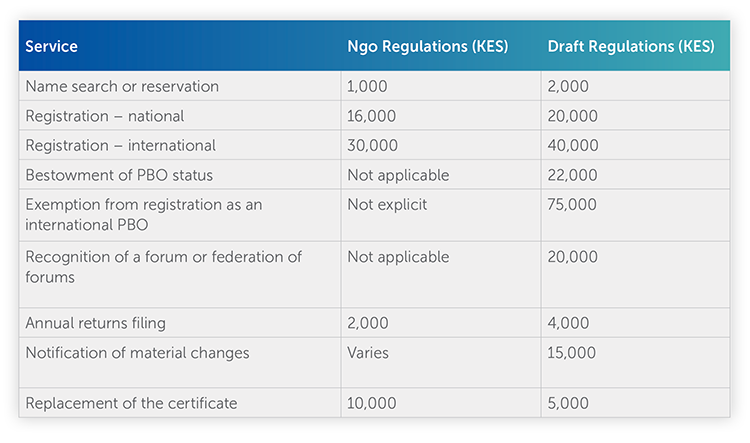Kenya publishes draft Regulations for Public Benefit Organisations
At a glance
- On 5 June 2025 the draft Public Benefits Organisations Regulations, 2025 (Draft Regulations) were unveiled by the Cabinet Secretary for Interior and National Administration under the Public Benefits Organisations Act 18 of 2013.
- This alert explores some of the key features and requirements introduced by the Draft Regulations.
- Public engagement is commenced on 19 June 2025 through a series of countrywide forums. The Public Benefits Organisations Regulatory Authority invites stakeholders and interested parties to submit their comments through a written memorandum by 25 July 2025.
The Draft Regulations establish a detailed framework covering three main categories of public benefit organisations (PBOs):
- National PBOs seeking initial registration.
- Existing entities seeking the bestowment of public benefit status.
- International organisations operating in or from Kenya.
Public benefit requirement
The Draft Regulations provide further details on the public benefit test that PBOs must meet to qualify for registration as a PBO. The Draft Regulations lay out detailed criteria compared to the Non-Governmental Organisations Co-ordination Regulations, 1992 (NGO Regulations), which focused more on an organisation’s objectives. This test requires that:
- The public benefit activity aligns with the definition under section 2 of the PBO Act and falls within the categories specified in the Sixth Schedule to the PBO Act.
- The beneficiaries are identifiable.
- The benefit is directly related to and not incidental to the public benefit purpose.
- The benefits and activities do not offer private benefits to office bearers, directors, their immediate family members or close business associates.
- If there are multiple charitable purposes, one purpose cannot be used to offset a lack of public benefit in another.
Bestowment of PBO status
Another significant introduction is the procedure of bestowing PBO status on existing organisations. This allows entities already incorporated under other Kenyan laws to apply for PBO status, provided they are in good standing with their existing registering authority, have been operating in or from Kenya for at least one year and have been undertaking a public benefit activity within the categories specified in the Sixth Schedule to the PBO Act.
This offers an alternative pathway for existing non-profit entities to transition into the PBO framework.
Compliance obligations
Annual returns
The Draft Regulations strengthen compliance requirements for Kenyan PBOs by mandating annual returns. This includes submission of audited accounts and comprehensive project reports to the Public Benefits Organisations Regulatory Authority (PBORA) by 31 March each year.
Previously, under the NGO Regulations, organisations were required to submit the annual report by 31 May each year.
Material Change Notifications
The Draft Regulations also require PBOs to report any material changes, including those related to their governance, address or banking details, to the PBORA within 30 days of the change, an increase from the 14-day timeline set out in the defunct NGO Regulations.
Self-regulation
The Draft Regulations provide for a framework for recognising forums and federations of forums for self-regulation purposes, including the criteria for joining and regulating forums and federations. The criteria for recognition of a forum include that it must have at least 10 PBOs engaging in related activities from the specified categories. For a federation of forums, it must consist of at least five forums of PBOs.
The forums will play a role in representing their interests, engaging in policy dialogue and promoting self-regulation within the sector. Self-regulation will facilitate co-ordination and collaboration among PBOs, leading to more coherent advocacy efforts and more efficient resource utilisation.
Engaging in economic activities
The Draft Regulations allow organisations to engage in lawful economic activities to support their public benefit purposes, provided that they obtain proper licensing and use proceeds solely for registered public benefit activities. This will give much-needed clarity on the permissible scope and conditions for PBOs to engage in economic activities, which may encourage sustainable funding models for PBOs.
Additionally, it will allow PBOs to diversify their funding sources and reduce over-reliance on traditional donor funding. Lastly, the clear guidelines will deter any situations where economic activities might overshadow the public benefit mission or lead to undue private gain.
This provision aligns with Paragraph 10 of the First Schedule of the Income Tax Act (Cap 470), which exempts the income of charitable organisations, provided that any business income is applied solely towards their charitable purposes and meets specified conditions, such as being integral to their mission or operated primarily by beneficiaries.
Fee schedule
The Draft Regulations introduce a comprehensive fee schedule relating to the pre-registration, registration and post-registration services for PBOs. Notably, several fees have been revised or introduced to align with the expanded scope and regulatory framework under the new regime.
A comparison of the proposed fees under the Draft Regulations and the defunct NGO Regulations is set out below:

Dispute resolution
The PBO Act introduced a new framework for handling disputes in the PBO sector. In the repealed NGO Act, appeals against decisions by the NGO Board were submitted to the Cabinet Secretary, which often raised concerns about independence and transparency. The PBO Act establishes an independent Public Benefit Organizations Disputes Tribunal (Tribunal).
On 17 June 2025, the National Assembly approved the appointment of the chairperson and members of the Tribunal following nominations by the Chief Justice. This marks a significant step toward the full operationalisation of the PBO framework and the strengthening of institutional oversight within the sector.
Conclusion
The Draft Regulations represent a significant overhaul of the regulatory framework for PBOs and align with the PBO Act. The new introductions aim to foster a transparent, accountable and well-governed sector. PBOs currently operating in Kenya and all other relevant stakeholders should carefully review these Draft Regulations and consider participating in the upcoming public consultation process, as the final regulations will substantially impact operational requirements and compliance costs.
Next steps
Public engagement commenced on 19 June 2025 through a series of countrywide forums. The PBORA invites stakeholders and interested parties to submit their comments through a written memorandum to ppregulations@pbora.go.ke by 5:00 p.m. on 25 July 2025.
We expect the final report on the Draft Regulations to be tabled before Parliament in early August 2025 for Committee review and subsequent gazettement.
The information and material published on this website is provided for general purposes only and does not constitute legal advice. We make every effort to ensure that the content is updated regularly and to offer the most current and accurate information. Please consult one of our lawyers on any specific legal problem or matter. We accept no responsibility for any loss or damage, whether direct or consequential, which may arise from reliance on the information contained in these pages. Please refer to our full terms and conditions. Copyright © 2026 Cliffe Dekker Hofmeyr. All rights reserved. For permission to reproduce an article or publication, please contact us cliffedekkerhofmeyr@cdhlegal.com.
Subscribe
We support our clients’ strategic and operational needs by offering innovative, integrated and high quality thought leadership. To stay up to date on the latest legal developments that may potentially impact your business, subscribe to our alerts, seminar and webinar invitations.
Subscribe




